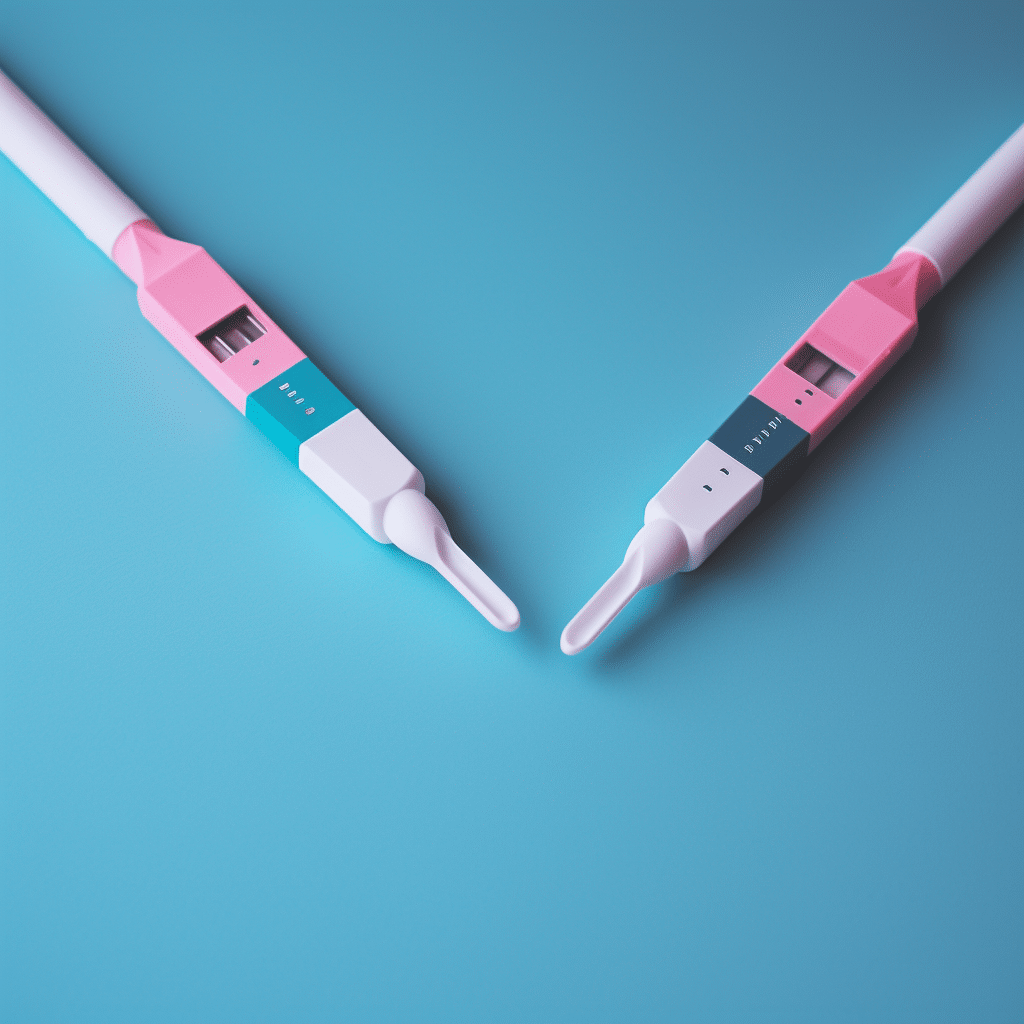
The Significance of Pregnancy Tests: Detection and Benefits
The importance of pregnancy tests: Pregnancy tests are critical for women to know if they are pregnant. They detect a hormone called human chorionic gonadotropin (hCG). If this hormone is present, it means that fertilization has occurred and the pregnancy has begun.
There are various types of pregnancy tests. The most common one is the home pregnancy test. It’s sold at drugstores and supermarkets. It’s affordable, easy to use, and can give results in minutes. Home pregnancy tests come in two forms: strip tests and cassette tests.
Strip tests involve dipping a thin plastic strip into urine or holding it under a stream of urine. If hCG is detected, then the test will show visible lines. Cassette tests require urine to be placed in a small window using an eyedropper or pipette. Like strip tests, they will also produce lines if hCG is present.
In addition to home pregnancy tests, there are clinical laboratory tests done by healthcare professionals. These include blood tests which can detect hCG more accurately than urine-based tests. Blood tests can detect lower levels of hCG, meaning they can give earlier detection.

The importance of pregnancy tests
Pregnancy tests are essential for determining if one is expecting. They provide dependable outcomes and are a key part of family planning. Here’s why they matter.
- The tests let women find out if they are having a baby, allowing them to start the right prenatal care.
- These tests also help women make wise decisions about their reproductive health and future.
- They help spot possible complications early, ensuring that needed medical help is given quickly.
- Pregnancy tests reduce stress and uncertainty, giving peace of mind to women who want to start or expand their families.
It’s noteworthy that pregnancy tests have changed a lot over time. The earliest reference to a pregnancy test was in ancient Egypt, where women would pee on barley and wheat. If the seeds grew, it meant the woman was pregnant. Nowadays, we depend on more sophisticated methods like urine or blood tests, which give accurate and fast results. These historical events emphasize the importance of pregnancy tests in human history.
Different types of pregnancy tests
Pregnancy tests come in different forms to fit different needs. Knowing these options can help you find the most fitting test for exact results.
Let’s look at a table:
| Test Type | Description | Accuracy | Ease of Use |
|---|---|---|---|
| Urine Test | Home-based test that looks for human chorionic gonadotropin hormone (hCG) in your urine. | High | Easy |
| Blood Test | Done at a medical facility. Checks levels of hCG hormone in blood to tell if you’re pregnant. | Very high | Needs medical help |
| Digital Test | Uses advanced tech to display results digitally, taking out any confusion from reading lines or symbols. | High | Easy |
| Early Detection Test | Detects lower levels of hCG hormone, allowing you to test earlier in your cycle. | High | Easy |
The table outlines important information about each type. Plus, there are other unique features and factors to think about.
Remember to use the test as instructed and during the recommended timeframe for best results.
Pro Tip: Consult a healthcare specialist if you have any worries or questions about pregnancy testing.
Factors to consider when choosing a pregnancy test
Deciding on the perfect pregnancy test can be daunting, but thinking about a few aspects can make your choice simpler. Here are some things to keep in mind:
- Sensitivity: Search for tests that have high sensitivity, which can recognize lower levels of hCG hormone, offering correct results even before a missed period.
- Accuracy: Make sure the test you select has a good accuracy rate, reducing the odds of wrong positives or negatives.
- Format: Go for traditional line tests or digital tests that display “pregnant” or “not pregnant” results clearly.
- Ease of use: Pick tests with straightforward instructions and user-friendly design for ease and accurate testing.
- Cost: Compare prices and choose a test that fits your budget without sacrificing quality.
- Testing time: Some tests give quicker results within minutes, while other tests take longer. Pick based on your preference and urgency.
It’s important to remember some special details about pregnancy tests. Not all brands are same – some may offer extra features like week estimations and early result indications. Also, certain tests may be more suitable for women with irregular periods or those who are actively trying to get pregnant.
Now that you know the factors to consider when choosing a pregnancy test, take action! Don’t let the fear of not knowing if you’re pregnant or not stop you. Get a trustworthy test now and begin your fascinating journey towards motherhood with confidence.
Frequently asked questions about pregnancy tests
Curious about pregnancy tests? Let’s explore some of the most common questions and find out all the answers!
- How do they work? Tests detect a hormone called hCG in a woman’s urine or blood. This hormone is made by the cells of the growing placenta.
- When can I take one? As early as 10 days after conception. For accurate results, wait until you’ve missed your period. Testing too soon may lead to false negative results.
- What types are there? Two main types: urine-based and blood tests. Urine tests are easy to use and give quick results. Blood tests can sense smaller amounts of hCG and confirm pregnancy earlier.
Did you know some tests have an indicator to show how many weeks you may be? It’s just an estimate though, so always consult a healthcare pro for accurate info.
Now, Lynn’s story. After months of trying to conceive, Lynn was anxious to find out if this time she was pregnant. She followed the instructions and waited for the results. When two pink lines appeared, she was overjoyed! She shared the news with her partner and they celebrated their journey into parenthood.
Pregnancy tests are powerful. Whether you’re impatiently waiting or feeling a mix of emotions, remember they confirm the start of a new chapter in your life.

Conclusion
The importance of pregnancy tests Different types of pregnancy tests have their own benefits and limits. Knowing these differences can help you choose the one perfect for you.
Urine-based tests, like common strip tests or digital tests, look for the hormone hCG in your pee. These tests are easy and not too pricey, but accuracy may be an issue.
Blood-based tests, instead, detect hCG in your bloodstream. They tend to be more precise than urine-based tests, specially during early pregnancy. These are usually done by healthcare experts and may be suggested if you had any miscarriage or related issues.
Ultrasound testing and fetal heartbeat monitoring are not common, but they can give more certainty about pregnancy and offer more info on the baby’s health.
To make sure your results are correct, take the test at the right time of your cycle and use the right methods for collecting samples.
If any doubts arise, speak to a healthcare specialist for advice and support. They can help you understand the results and give any required medical advice.
Frequently Asked Questions
Q: What are the different types of pregnancy tests?
A: There are three main types of pregnancy tests: urine tests, blood tests, and ultrasound exams.
Q: How do urine tests work?
A: Urine tests check for the presence of human chorionic gonadotropin (hCG), a pregnancy hormone. These tests can be done at home using a kit or at a healthcare provider’s office.
Q: Are urine tests accurate?
A: Yes, urine tests are generally accurate. However, it is important to follow the instructions carefully and take the test at the right time for accurate results.
Q: What are blood tests?
A: Blood tests measure the level of hCG in the blood. Pregnancy can be detected sooner with these tests than with urine tests, and they are performed in a doctor’s office.
Q: Are blood tests more accurate than urine tests?
A: Blood tests are considered more accurate than urine tests, especially in early pregnancy. They can measure lower levels of hCG and provide quantitative results.
Q: What are ultrasound exams?
A: Ultrasound exams use sound waves to create images of the uterus, providing visual confirmation of pregnancy. A medical practitioner is usually the one who conducts these kinds of tests.